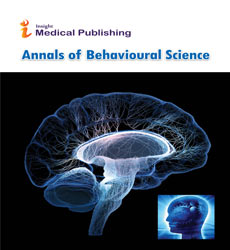Nursing Informatics with Information Technologies
Akina Akira*
Department of Psychiatrist, Kyoto University, Japan
- *Corresponding Author:
- Akina Akira
Department of Psychiatrist, Kyoto University, Japan
Tel: 815646578368
E-mail: akina.akira@gmail.com
Received: March 16, 2022, Manuscript No. IPABS-22-12166; Editor assigned: March 19, 2022, PreQC No. IPABS-22-12166 (PQ); Reviewed: April
02, 2022, QC No. IPABS-22-12166; Revised: April 05, 2022, Manuscript No. IPABS-22-12166 (R); Published: April 08, 2022, DOI:
10.36648/2471-7975.8.3.61.
Citation: Akira A (2022) Nursing Informatics with Information Technologies. Ann of Behave Sci Vol:8 No:3
Introduction
Mental illness, also known as mental illness or mental illness is a behavioral or mental pattern that causes significant distress or disability to an individual's performance. Such traits can appear as permanent, recurrent, remission, or a single episode. Many illnesses have been reported, and the signs and symptoms vary widely from individual illness to individual illness. Such disorders can be diagnosed by a psychiatrist, usually a clinical psychologist or psychiatrist. The cause of mental illness is often unknown. Knowledge from different disciplines can be incorporated into theory. Mental illness is usually defined by a combination of human behavior, emotions, perceptions, or thoughts. It can often be associated with a particular area or function of the brain in a social context. Mental illness is an aspect of mental health. Cultural and religious beliefs, as well as social norms, should be considered when making a diagnosis.
Services are in psychiatric hospitals or communities, evaluations use different methods such as psychiatrists, psychologists, mental health nurses, psychiatric tests, but often rely on observations and interviews, etc. Performed by a mental health professional. Treatment is done by various psychologists. Psychotherapy and psychiatric drugs are two important treatment options. Other treatments include lifestyle changes, social intervention, peer support, and self-help. In some cases, unwilling imprisonment or treatment may occur. Prevention programs have been shown to reduce depression.
In 2019, the most common mental illnesses in the world are depression, which affects about 264 million people, bipolar disorder, which affects about 45 million people, dementia, which affects about 50 million people, and schizophrenia. There are mental illnesses such as dementia, of which about 20 million are affected. Neurodevelopmental disorders include intellectual disabilities and autism spectrum disorders that usually occur in infancy or childhood. Stigma and discrimination can exacerbate the pain and disability associated with mental illness, lead to better understanding and various social movements to combat social exclusion Psychotherapy is a trained psychiatric treatment for mental illness. Psychotherapy seeks to explore thoughts, feelings, and behaviors and improve an individual's well-being. Psychotherapy combined with drug therapy is the most effective way to promote recovery.
Each mental illness is different, but here are seven common signs that can help you determine if you or your loved one is suffering.
Changes in emotions and behavior:
- Lost interest
- Changes in sleep habits
- Low energy
- Difficulty of interaction
- Changes in appetite or weight
- Uncontrollable emotions
- Behavioral Support Resources
- Pharmacotherapy
Many psychotropic drugs are very effective and are widely used by psychiatrists and other physicians. These drugs are often categorized primarily according to the disorder prescribed. Antidepressants are used, for example, to treat depression. Electroconvulsive therapy.
Electroconvulsive therapy places electrodes on the head and gives the brain a series of electric shocks while anesthetizing and inducing short-term seizures. This treatment has consistently been shown to be the most effective treatment for major depression. Many people treated with electroconvulsive therapy experience temporary memory loss. However, in contrast to its media representation, electroconvulsive therapy is safe and rarely causes further complications. Modern use of anesthetics and muscle relaxants has significantly reduced risk psychotherapy.
In recent years, great progress has been made in the field of psychotherapy, sometimes referred to as talk therapy. By creating an atmosphere of empathy and acceptance, therapists can often help the person identify the cause of the problem and consider alternatives to address them. The emotional perceptions and insights that a person gains through psychotherapy often leads to changes in attitudes and behaviors that enable one to lead a more fulfilling and happy life. Psychotherapy is appropriate and effective for a variety of conditions. Even people without mental illness find that psychotherapy can help address problems such as work difficulties, bereavement, and chronic family illnesses. Group psychotherapy, couple therapy, and family therapy are also widely used.
Open Access Journals
- Aquaculture & Veterinary Science
- Chemistry & Chemical Sciences
- Clinical Sciences
- Engineering
- General Science
- Genetics & Molecular Biology
- Health Care & Nursing
- Immunology & Microbiology
- Materials Science
- Mathematics & Physics
- Medical Sciences
- Neurology & Psychiatry
- Oncology & Cancer Science
- Pharmaceutical Sciences
